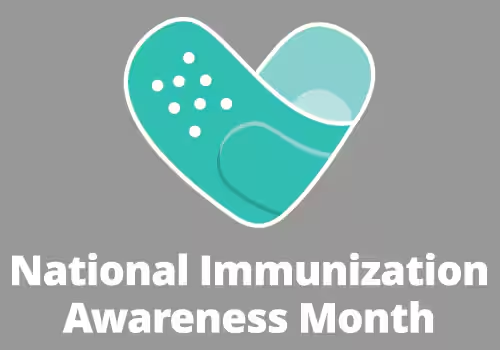
National Immunization Awareness Month (NIAM) is an annual observance that highlights the importance of vaccinations for people of all ages.
With the new school year just around the corner, it is a great time to get your family caught up on their routine vaccinations.
Staying current with routine vaccinations during childhood, adolescence, and adulthood can prevent many diseases that were once common. Data from the CDC, Centers for Disease Control, shows that during the Covid-19 pandemic, many of us missed routine vaccinations and have yet to catch up. This is concerning since we know the best way to stay protected from some viruses is to keep up with vaccines throughout life.
Vaccinations for Children
When kids are not vaccinated, they are not only at increased risk for catching diseases, but they can also spread illness to others in their daycare centers, playgroups, classrooms, and communities. National Immunization Awareness Month is a great time to remind your family and friends of the important role of routine vaccinations for children.
Talk to your child’s pediatrician or family doctor to find out if they are up to date with all the vaccinations recommended for their age group.
Childhood vaccines protect against 14 serious diseases by the age of two including:
- Diphtheria
- Tetanus
- Polio
- Pertussis (whooping cough)
- Mumps
- Measles
- Rubella (MMR – mumps measles, rubella)
- Varicella (chicken pox)
- Haemophilus influenzae type b (Hib)
- Hepatitis B
- Pneumococcal disease
- Covid-19
- Flu
- Rotavirus
Getting routine vaccinations is one of the safest ways to protect yourself and your family from some serious viral invaders.
Vaccinations for Adolescence – Teens & Pre-teens
As kids grow up, they are at increased risk for meningococcal disease and infections that can lead to HPV-related cancers. In addition, some of their childhood vaccinations wear off over time so preteens and teens may need booster shots to stay protected from serious diseases like diphtheria, tetanus, and pertussis.
Parents should to their family doctor to make sure their teen’s vaccinations are up to date. Vaccinations and booster shots recommended for teens and pre-teens include:
HPV – The CDC recommends that all preteens get an HPV vaccination so they are protected from Human Papillomavirus (HPV) infections that can cause cancer later in life.
- 11- to 12-year-olds receive two doses of the HPV vaccine 6-12 months apart.
- Tdap – tetanus, diphtheria & pertussis booster
- Covid-19 – Vaccinations are recommended by the CDC for everyone 6 months and older.
- Influenza – The CDC recommends that everyone 6 months and older should get a flu vaccine every year ideally by the end of October
- Meningococcal disease (MenB & MenACWY)
Vaccinations for Adults – Ages 19 to 49
Vaccinations are not just for kids. For adults, getting routine vaccinations is one of the safest ways to protect their health.
Vaccines help prevent catching and spreading serious illnesses that could result in poor health, medical bills, missed work, and not being able to care for your family.
You should talk to your primary care physician to make sure you are current with all the recommended vaccinations for your age group including flu, Covid-19, Varicella, Hepatitis, MMR, and Tdap.
Vaccinations for Older Adults – Age 50 & Up
As we age, we are at a higher risk for developing serious complications from illnesses like the flu.
This is especially true for those who have other underlying health conditions such as heart disease, lung conditions, or diabetes.
Talk to your doctor to learn which vaccines are recommended for you based on your age and other factors.
Vaccinations recommended for people over 50 include:
- Influenza (Flu) – every year in the fall
- TD – for protection against tetanus (every ten years)
- Tdap – tetanus, diphtheria & pertussis (this vaccine is given instead of TD)
- Shingrix – Given in two doses to prevent shingles and related complications.
- PCV20 and PCV15 – to prevent Pneumococcal disease, a severe bacterial infection that can affect your lungs, blood, and brain. Pneumococcal pneumonia is contagious and can spread from person to person. For seniors, pneumonia can be serious and life-threatening, especially if you have underlying health issues such as COPD or diabetes.
National Immunization Awareness Month is a great time to talk to your doctor to ensure you and your family are protected against serious diseases by staying up to date on your routine vaccinations.
Whether you need to catch up on your routine vaccinations, have health concerns, or it is just time for your annual visit, contact the caring professionals at River Bend Medical Associates for an appointment today. At River Bend Medical Associates, we care about your health and as part of your medical team, we are here to provide you with the best care in all aspects of your healthcare needs. For more information on our medical practice, or to make an appointment contact River Bend Medical Associates, or call 916-392-4000.


